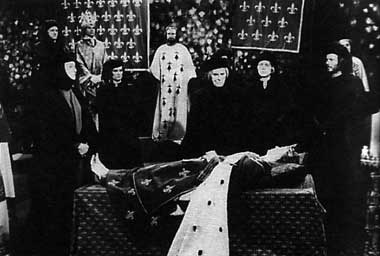- Accueil
- Actualité
- Filmographieet autres oeuvres
- Notes sur la filmographie
- Raoul Ruiz Cinéaste
- Litoral, cuentos del mar
- Tres tristes tigres
- Klimt
- Agathopedia
- El Tango del viudo
- La Catenaria
- Le Retour
- La Maleta
- La Maison Nucingen
- Le Don
- La Recta provincia
- Le Domaine perdu
- Dias de campo
- Edipo
- Chronique d'une mise en scène
- Une Place parmi les vivants
- Vertige de la page blanche
- Ce jour-là
- Miotte vu par Ruiz
- Cofralandes
- Combat d'amour en songe
- Comédie de l'innocence
- Les Ames fortes
- Comédie d'innocence (version Fresnoy)
- Le Temps retrouvé
- Shattered Image
- Le Film à venir
- Généalogies d'un crime
- La Comédie des ombres
- Nemesis divina
- The Suicide club
- Turis eburnia
- Wind and Water (Feng Shui)
- Promenade
- Notte oscura dell'Inquisitore
- Trois vies et une seule mort
- Fado majeur et mineur
- Il Viaggio clandestino - Vite di santi e di peccatori
- Capitolo 66
- Miroirs de Tunis
- Las Soledades
- A T.V Dante
- L'Œil qui ment
- Visions et merveilles de la religion chrétienne
- Basta la palabra
- L'Exote
- La Telenovela errante
- The Golden Boat
- Le Livre de Christophe Colomb
- Il Pozzo dei pazzi
- Responso : Homage to Huub Bals
- Humitas
- L'Autel de l'amitié
- Tous les nuages sont des horloges
- Derrière le mur
- Paya e tala, une visite chez Farid Belkahia
- Histoires de glace
- La Chouette aveugle
- Le Professeur Taranne
- Mémoire des apparences
- Régime sans pain
- Mammame
- Angola ou les enfants du bannissement
- L'Evéillé du pont de l'Alma
- L'Île au trésor
- Richard III
- Les Destins de Manoel
- Dans un miroir
- Voyages d'une main
- Lourdes
- 7 faux raccords
- Voyage autour de ma chambre
- La Ville des pirates
- Lettre d'un cinéaste ou le Retour d'un amateur de bibliothèques
- Point de fuite
- Bérénice
- La Présence réelle
- Les Trois couronnes du matelot
- Photographies
- Querelle de jardins
- Ombres chinoises
- Le Petit théâtre
- Classification des plantes
- Le Toit de la baleine
- Image de sable
- Le Territoire
- Pages d'un catalogue
- La Ville nouvelle
- Télétests
- Musée Dali
- Fahlstrom
- Le Borgne
- Petit manuel d'histoire de France
- Jeux
- Images de debats
- L'Hypothèse du tableau volé
- Les Divisions de la nature
- De grands événements et de gens ordinaires
- La Vocation suspendue
- Colloque de chiens
- Sotelo
- El cuerpo repartido y el mundo al reves
- Dialogue d'exilés
- Nueva cancion (Chilena)
- El Realismo socialista considerado como una de las bellas artes
- Palomita brava
- Palomita blanca
- Abastecimiento
- Los Minuteros
- Poesia popular, la teoría y la práctica
- La Expropiacion
- Nadie dijo nada
- Ahora te vamos a llamar hermano
- La Colonia penal
- ¿Que hacer?
- Militarismo y tortura
- A Closed Book
- L’estate breve
- Mystères de Lisbonne
- El Pasaporte amarillo
- Ballet aquatique
- La Nuit d'en face
- Le jeu de l'oie
- Raoul Ruiz Acteur
- Raoul Ruiz Metteur en Ondes
- Raoul Ruiz Metteur en scène
- Raoul Ruiz Scénariste
- Expositions de Raoul Ruiz
- Raoul Ruiz Producteur
- Films sur Raoul Ruiz
- Documentation
Le Cinéma de Raoul Ruiz
Petit manuel d'histoire de France
long métrage fiction vidéo France (1979) 2x50min.
Autre titre :
1. "Des ancêtres les Gaulois à la prise du pouvoir par Louis XIV" 2. "De la révocation de l'Édit de Nantes à l'invention du cinéma" Réalisé par :
Raoul RuizSynopsis :
«Rue des Archives» illustre un type de recherches sur l'utilisation des archives télévisuelles conservées par l'Ina. Images vivantes contenant leur propre sens et livrées à la libre lecture d'auteurs-réalisateurs qui ont pu y investir leur sensibilité sans le moindre tournage ni moindre commentaire.Scénario :
Raoul RuizMontage :
Valeria SarmientoD'après :
des livres de classe (1903, 1929, 1958, 1968) et des archives de télévisionProduction :
INA, collection Rue des archives, FR3Petit manuel d'histoire de France
The University of California, Berkeley Art Museum and Pacific Film Archive 17 février 1986
Raúl Ruíz, a Chilean working in France, was the subject of an April 1984 PFA retrospective. He has produced feature length films under the auspices of French and Italian television (including Three Crowns of a Sailor, The Territory, etc.) in addition to a number of works for television. Ian Christie writes in Afterimage (#10): "If Ruíz became a 'television filmmaker' almost inadvertently...he has found that the strictures of television, like those of exile, can be put to good use.... Two main strategies inform Ruíz's approach to television: they are parody and literalism...both calculated to subvert the normal discourse of television.... Petit manuel d'histoire de France...commissioned by INA as part of a series of programs using archive material...proposes nothing less than a complete history of France, taking the numerous plays and dramatic series...as its raw material and faithfully following a consensus of school history primers. It is a work of pure collage, or photo-montage...both hilarious and instructive, less about French history...than about the conventions of that latter-day equivalent of the medieval chronicle, the historical drama. Rather than draw attention to the absences in French tele-history, to its (doubtless) evasions and distortions...Ruíz massively reinforces its repetitions and stereotypes to the point of narrative excess and absurdity--as when he intercuts no less than four Jeanne d'Arcs, and when the same actors recur in characteristic roles throughout 'history', thus reducing...the idea of 'great men' to a series of starring parts...."
